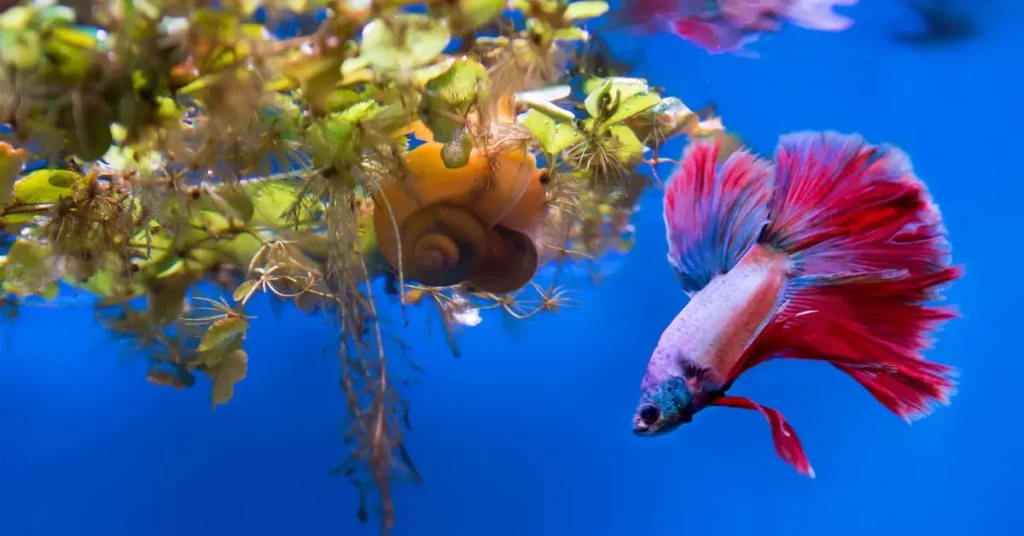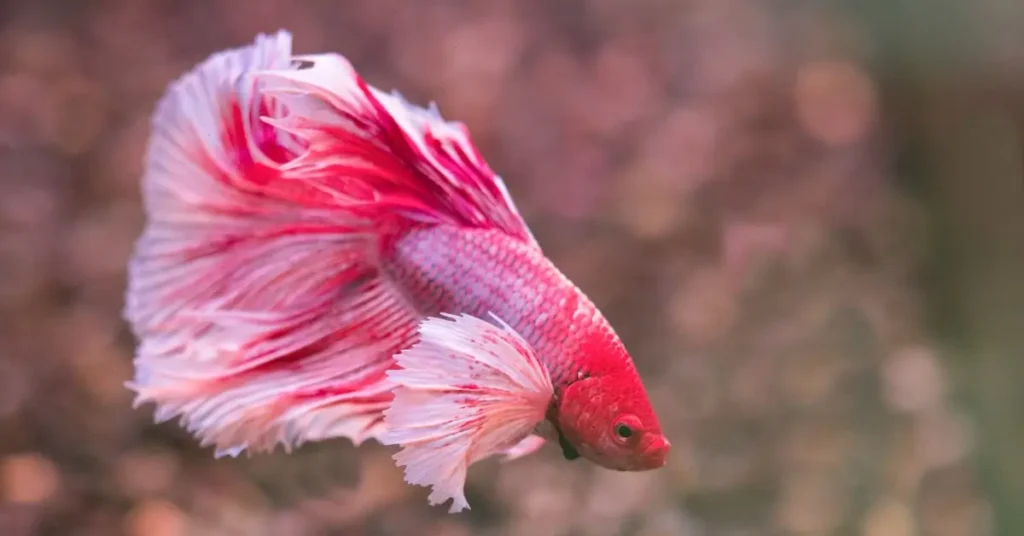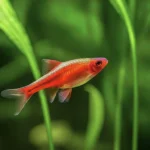Introduction to Betta Fish
Betta fish, also known as Siamese fighting fish, are one of the most popular aquatic pets in the world. These colorful and charismatic fish are native to the tropical waters of Southeast Asia and have captured the hearts of aquarium enthusiasts for decades. In this comprehensive guide, we’ll dive deep into the world of betta fish, exploring their origins, types, care requirements, and more.
What are Betta Fish?
Betta fish are small, vibrant freshwater fish that belong to the Osphronemidae family.
They are known for their striking colors, flowing fins, and unique personalities. Male
bettas are especially eye-catching, with long, flowing fins and bright, iridescent scales
that shimmer in the light.
Origin and History of Betta Fish
Betta fish are native to the shallow waters of Thailand, Cambodia, and Vietnam. In the
wild, they inhabit rice paddies, slow-moving streams, and murky ponds. For centuries,
betta fish have been bred for their aggressive nature and used in traditional fish-fighting
contests in Southeast Asia. Today, however, they are primarily kept as ornamental pets
and admired for their beauty.
Types of Betta Fish
There are many different types of betta fish, each with its own unique characteristics
and appearance. Here are some of the most popular types:
Halfmoon Betta Fish
Halfmoon bettas are named for their impressive caudal fin, which forms a perfect 180-
degree semicircle when fully extended. These fish are known for their large, flowing fins
and vibrant colors.
Crowntail Betta Fish
Crowntail bettas have long, spiky fins that resemble a crown or comb. Their fins are
more delicate than those of other types of bettas and require extra care to prevent
damage.
Veiltail Betta
Veiltail bettas are one of the most common types of betta fish. They have long, flowing
fins that drape down like a veil, hence their name. Veiltails come in a wide range of
colors and patterns.
Plakat Betta Fish
Plakat bettas, also known as “fighting fish,” have shorter fins than other types of bettas.
They are more active and aggressive than their long-finned counterparts and are often
used in fish-fighting contests in Southeast Asia.
Double Tail Betta Fish
Double-tail bettas have a unique genetic mutation that causes them to have two
separate caudal fins instead of one. This gives them a fuller, more voluminous
appearance.
Dumbo Betta Fish
Dumbo bettas, also known as elephant ear bettas, have large, round pectoral fins that
resemble the ears of an elephant. These fins can be quite delicate and require extra
care to prevent damage.
Giant Betta Fish
Giant bettas are, as their name suggests, larger than other types of betta fish. They can
grow up to 5 inches in length and require a larger tank than their smaller counterparts.
Wild Betta Fish
Wild bettas are the ancestors of the domesticated betta fish we know today. They are
typically less colorful than their captive-bred counterparts but are prized by some
collectors for their natural beauty and hardiness.
Rare Betta Fish
There are many rare and exotic types of betta fish, such as the black orchid betta, the
mustard gas betta, and the dragon scale betta. These fish are highly sought after by
collectors and can command high prices.

Betta Fish Colors
Betta fish come in a dazzling array of colors, from deep reds and blues to shimmering
purples and pinks. Here are some of the most popular betta fish colors:
Red Betta Fish
Red bettas are one of the most iconic and popular colors. They can range from a deep,
rich crimson to a bright, fiery orange-red.
Blue Betta Fish
Blue bettas are another popular choice, with colors ranging from a deep, royal blue to a
bright, electric blue. Some blue bettas also have iridescent scales that shimmer in the
light.
Purple Betta Fish
Purple bettas are a stunning and unique color variation. They can range from a deep,
rich purple to a lighter, more lavender hue.
Pink Betta Fish
Pink bettas are a soft and feminine color option. They can range from a pale, blush-pink
to a brighter, more vibrant shade.
Other Betta Fish Colors
In addition to the colors mentioned above, betta fish can also come in a wide range of
other hues, including:
- Green
- Yellow
- Orange
- White
- Black
- Multicolored (marbled, butterfly, etc.)
Betta Fish Care
Caring for a betta fish is relatively easy, but there are some important things to keep in
mind to ensure your pet stays healthy and happy.
Betta Fish Tank Setup
When setting up a tank for your betta fish, there are a few key things to consider:
Tank Size
Betta fish require a minimum tank size of 2.5 gallons, although larger is always better. A 5-gallon tank is ideal for a single betta fish.
Filtration
Betta fish require a gentle filtration system to keep their water clean and healthy. A
small sponge filter or a low-flow hang-on-back filter is a good choice.
Heating
Betta fish are tropical fish and require a water temperature between 75-80°F (24-27°C).
A small aquarium heater is necessary to maintain a stable water temperature.
Plants and Decorations
Betta fish appreciate a well-planted tank with plenty of hiding spots and resting places.
Live or silk plants, caves, and other decorations can help create a comfortable and
stimulating environment for your betta.
Betta Fish Diet
Betta fish are carnivores and require a diet high in protein. Here are some tips for
feeding your betta:
Best Betta Fish Food
The best food for betta fish is a high-quality, protein-rich pellet or flake food, specifically
designed for bettas. Avoid generic tropical fish food, as it may not meet your betta’s
nutritional needs.
Feeding Schedule
Betta fish should be fed in small amounts, 2-3 times per day. Overfeeding can lead to
health problems, so be sure to only feed your betta as much as they can consume in 2-
3 minutes.
How Long Can Betta Fish Go Without Food?
Betta fish can survive without food for up to 14 days, but it’s not recommended to leave
them without food for more than a few days at a time. If you’ll be away from home for an
extended period, consider using a slow-release feeding block or asking a friend or
family member to feed your betta.
Betta Fish Behavior
Betta fish aren’t just a pretty face! These fish exhibit a range of fascinating behaviors that offer insights into their needs and personalities. Understanding these behaviors is crucial for providing optimal care.
Key Betta Fish Behaviors
- Flaring for Show: Bettas flare their fins and gills in impressive displays of dominance or courtship. This is a natural and visually striking behavior.
- Bubble Nest Builders: Male bettas create intricate bubble nests at the water’s surface, a sign of their readiness to mate.
- Natural Explorers: Bettas love to investigate their surroundings, poking through plants and decorations. A stimulating environment keeps them happy and engaged.
- Getting to Know You: Bettas can learn to recognize their owners, become excited at feeding time, and create a special bond.
Betta Fish Tank Mates
Betta fish are known for their aggressive nature and are best kept alone or with
peaceful, non-aggressive tank mates. Some good options include:
- Snails
- Shrimp
- Neon tetras
- Harlequin rasboras
- Cory catfish
Avoid keeping bettas with other aggressive fish, such as other bettas, cichlids, or barbs.
Betta Fish Health
Like all pets, betta fish are susceptible to certain health problems. Here are some
common betta fish diseases to watch out for:
Common Betta Fish Diseases
Betta Fish Ich
Ich, also known as white spot disease, is a common parasitic infection in betta fish.
Symptoms include small white spots on the body and fins, lethargy, and loss of appetite.
Ich can be treated with medication and by raising the water temperature.
Betta Fish Bloating
Bloating is another common health problem in betta fish. It can be caused by
overfeeding, constipation, or bacterial infections. Symptoms include a swollen belly,
lethargy, and loss of appetite. Bloating can often be treated by fasting the fish for a few
days and then feeding them a high-fiber diet.
Betta Fish Lifespan
With proper care, betta fish can live for 2-4 years in captivity. Some bettas have even
been known to live for up to 10 years!
Breeding Betta Fish
Breeding betta fish can be a rewarding experience for advanced aquarium hobbyists.
Here are some things to keep in mind when breeding bettas:
Betta Fish Eggs
Female bettas can lay up to 500 eggs at a time. The male will then fertilize the eggs and
care for them until they hatch, which typically takes 24-36 hours.
Interesting Facts About Betta Fish
- In the wild, betta fish often live in puddles and shallow water that is only a few inches deep.
- Male bettas build bubble nests at the surface of the water to protect their eggs and fry.
- Betta fish have a special organ called a labyrinth that allows them to breathe air from
the surface of the water. - The name “betta” comes from the ancient clan of warriors known as the “Bettah.”
Conclusion
Betta fish are a fascinating and rewarding pet that can bring joy and beauty to any home
aquarium. By providing your betta with a proper diet, clean water, and a comfortable
environment, you can help them thrive and live a long, healthy life. Whether you’re a
seasoned aquarium enthusiast or a first-time fish owner, a betta fish can make a
wonderful addition to your family.
Do Betta Fish Sleep?
Yes, betta fish do sleep! They typically rest on the bottom of the tank or near the
surface, and may appear to be motionless for long periods of time.
How Do Betta Fish Sleep?
Betta fish don’t have eyelids, so they sleep with their eyes open. They may also change color slightly while sleeping, becoming paler or more muted in appearance.
Do Betta Fish Have Teeth?
Yes, betta fish do have teeth! They have small, sharp teeth that they use to capture and eat their food. However, their teeth are too small to pose any danger to humans.
How often should I clean my betta fish’s tank?
It’s recommended to perform a partial water change (about 25-30%) once a week to
keep the water clean and healthy for your betta.
Can I keep two male bettas together?
No, male bettas are highly territorial and will fight if kept together in the same tank. It’s best to keep them in separate tanks or with peaceful, non-aggressive tank mates.
How can I tell if my betta fish is happy and healthy?
A happy and healthy betta fish will be active, have a good appetite, and display bright, vibrant colors. They should also have clear eyes, intact fins, and no signs of disease or stress.
Do betta fish need a heater?
Yes, betta fish are tropical fish and require a stable water temperature between 75-
80°F (24-27°C). A small aquarium heater is necessary to maintain this temperature
range.
How long can betta fish live?
With proper care, betta fish can live for 2-4 years in captivity. Some bettas have even
been known to live for up to 10 years!

